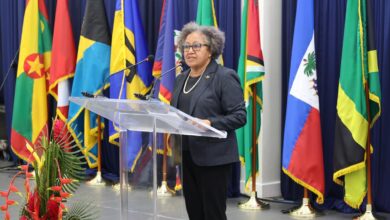Heads of Government of the Caribbean Community, meeting in Antigua & Barbuda on July 2-4, 2008, examined matters affecting the level of preferential access to the European market – preferences that have been instrumental in raising thousands of small farmers out of poverty, enabled them to achieve commendable levels of social and environmental responsibility and which have facilitated the contribution of the banana industry to the development of the Member States concerned.
Heads of Government noted that, while the recently initialled Economic Partnership Agreement (EPA) will shield the Region’s preferential access to the EU market from further legal challenge in the WTO, developments in negotiations under the Doha Development Agenda (DDA) threatened to reduce severely the European Union’s MFN tariff on bananas, which is the instrument that enables the Region to continue exporting profitably to the European market.
It was observed that the group of MFN suppliers – who were granted quota-free access to the EU market in January 2006 and whose exports have increased by 10% since then – have continued to call for substantial reductions in the EU’s tariff, the only effect of which would be to severely damage the interests of Caribbean producers. It was noted, in contrast, that, in 2007, banana exports by the African, Caribbean and Pacific (ACP) group to the EU declined by 9% and that almost every CARICOM exporter experienced declines in their exports for that year.
Heads of Government further noted that, once again, the Caribbean had found itself excluded from discussions between the EU and the MFN suppliers, the results of which could be devastating for its economic interests. Heads of Government also observed that, in the WTO Doha negotiations, the same group of countries, claiming to be interested in the liberalization of “tropical products”, has as its main objective the elimination of the small share of the EU market available to banana producers in the African, Caribbean and Pacific (ACP) countries.
Heads of Government noted with appreciation, the Joint Statement emanating from a Meeting of Ministers of agriculture and representatives of Cameroon, Cyprus, the Dominican Republic, France, Ghana, Greece, Cote d’Ivoire, Jamaica, Madagascar, Portugal, Spain and Suriname held in Paris on April 30, 2008, which upheld the importance of maintaining a stable banana market in the EU, catering in a balanced way to the interests of all those who participate in it.
They also reaffirmed the Resolution of the 87th Session of the ACP Council of Ministers held in Addis Ababa on June 8-13, 2008, which, among other things, rejected any proposal that would have the effect of drastically reducing the current applied tariff of Euro 176/tonne.
Heads of Government affirmed that, if the outcome of the WTO Doha Development Agenda negotiations are to be balanced, there must be suitable treatment for bananas and other products that are the subject of long-standing preferences and that if this were not to be the case, Caribbean countries would find it impossible to join in any consensus that may emerge in the current talks.





